Kristine Kruszelnicki+Posted by on May 13, 2013 in Featured posts, Reasoned Arguments |
The following piece was originally submitted to The Humanist after their September/October edition of the Humanist featured an article by Marco Rosaire Rossi questioning the existence of pro-life atheists. The piece, though as extensive as possible in answering standard pro-choice arguments, was ultimately rejected because it didn’t answer a number of other questions (including contraception and early vs late-term abortion) that a 2,500 word limit simply could not allow. While I hope to work with the editor for a future re-write, here is the original piece for your reading:
A SECULAR CASE AGAINST ABORTION
By: Kristine Kruszelnicki
“Is there really such a thing as a pro-life atheist?” asked Marco Rosaire Rossi in the September/October edition of the The Humanist. “What’s next, Intelligent Design Agnostics? How about Secularists for Sharia Law?”
Atheists may not have a pope, but in the eyes of many there is still a proper dogma that all good atheists must adhere to. To be an atheist is to support abortion. Fail to do so and you will be denounced as “secretly religious.” When I joined an agnostic and an atheist from Secular Pro-Life for an information table at the 2012 American Atheist Convention, a popular atheist blogger accused us outright of having “actually lied about being atheist.” [Edit: She also seriously misheard and misconstrued the point of my green banana analogy!]
There is an obvious reluctance to accept that non-religious pro-lifers exist. But we do exist. While we differ somewhat in our approaches and philosophies, our numbers include atheist thinkers like Robert Price, author of “The Case Against the Case for Christ,” civil libertarian writer Nat Hentoff, philosophers Arif Ahmed and Don Marquis, and liberal anti-war activist Mary Meehan, to name a few.
The late atheist author Christopher Hitchens, when asked in a January 2008 debate with Jay Wesley Richards whether he was opposed to abortion and was a member of the pro-life movement, replied:
“I’ve had a lot of quarrels with some of my fellow materialists and secularists on this point, [but] I think that if the concept ‘child’ means anything, the concept ‘unborn child’ can be said to mean something. All the discoveries of embryology [and viability] – which have been very considerable in the last generation or so – appear to confirm that opinion, which I think should be innate in everybody. It’s innate in the Hippocratic Oath, it’s instinct in anyone who’s ever watched a sonogram. So ‘yes’ is my answer to that.”
Secular pro-lifers include seasoned atheists and agnostics, ex-Christians, conservatives, liberals, vegans, gays and lesbians, and even pro-lifers of faith, who understand the strength of secular arguments with secular audiences. The following secular case against abortion is one perspective, and does not represent any single organization.
Abortion, The Complex Issue?
Abortion is an emotionally complex issue, stacked with distressing circumstances that elicit our sympathy and compassion, but abortion is not morally complex: If the preborn are not human beings equally worthy of our compassion and support, no justification for abortion is required. Women should maintain full autonomy over their bodies and make their own decisions about their pregnancies. However, if the preborn are human beings, no justification for abortion is morally adequate, if such a reason cannot justify ending the life of a toddler or any born human in similar circumstances.
Would we kill a two year-old whose father suddenly abandons his unemployed mother, in order to ease the mother’s budget or prevent the child from growing up in poverty? Would we dismember a young preschooler if there were indications she might grow up in an abusive home? If the preborn are indeed human beings, we have a social duty to find compassionate ways to support women, that do not require the death of one in order to solve the problems of the other.
Science vs Pseudoscience
While some abortion advocates have accused pro-lifers of using “pseudoscience”, in fact scientific evidence strongly backs the pro-life claim that the human embryo and fetus are biological members of the human species. Dr. Keith L. Moore’s “The Developing Human: Clinically Oriented Embryology,” used in medical schools worldwide, is but one scientific resource confirming this knowledge. It states:
“Human development begins at fertilization, the process during which a male gamete or sperm (spermatozoo development) unites with a female gamete or oocyte (ovum) to form a single cell called a zygote. This highly specialized, totipotent cell marked the beginning of each of us as a unique individual.”
Unlike other cells containing human DNA – sperm, ovum and skin cells, for instance – the newly fertilized embryo has complete inherent capacity to propel itself through all stages of human development, providing adequate nutrition and protection is maintained. Conversely, sperm and ovum are differentiated parts of other human organisms, each having their own specified function. Upon merging, both cease to exist in their current states, and the result is a new and whole entity with unique behavior toward human maturity. Similarly, skin cells contain genetic information that can be inserted into an enucleated ovum and stimulated to create an embryo, but only the embryo possesses this self-directed inherent capacity for all human development.
Defining Personhood
The question of personhood leaves the realm of science for that of philosophy and moral ethics. Science defines what the preborn is, it cannot define our obligations toward her. After all, the preborn is a very different human entity than those we see around us. Should a smaller, less developed, differently located and dependent being be entitled to rights of personhood and life?
Perhaps the more significant question is: are these differences morally relevant? If the factor is irrelevant to other humans’ personhood, neither should it have bearing on that of the preborn. Are small people less important than bigger or taller people? Is a teenager who can reproduce more worthy of life than a toddler who can’t even walk yet? Again, if these factors are not relevant in granting or increasing personhood for anyone past the goal post of birth, neither should they matter where the preborn human is concerned.
One might fairly argue that we do grant increasing rights with skill and age. However, the right to live and to not be killed is unlike the social permissions granted on the basis of acquired skills and maturity, such as the right to drive or the right to vote. We are denied the right to drive prior to turning 16; we are not killed and prevented from ever gaining that level of maturity.
Similarly, consciousness and self-awareness, often proposed as fair markers for personhood, merely identify stages in human development. Consciousness doesn’t exist in a vacuum. It exists only as part of the greater whole of a living entity. To say that an entity does not yet have consciousness is to nonetheless speak of that entity within which lies the inherent capacity for consciousness, and without which consciousness could never develop.
As atheist Nat Hentoff points out, “It misses a crucial point to say that the extermination can take place because the brain has not yet functioned or because that thing is not yet a ‘person’. Whether the life is cut off in the fourth week or the fourteenth, the victim is one of our species, and has been from the start.”
The inherent capacity for all human function lies within the embryo because she is a whole human entity. Just as one would not throw out green bananas along with rotten bananas though both lack current function as food, one cannot dismiss a fetus who has not yet gained a function, alongside a brain-dead person who has permanently lost that function. To dismiss and terminate a fetus for having not yet achieved a specified level of development is to ignore that a human being at that stage of human development is functioning just as a human being of that age and stage is biologically programmed to function.
Location and Singular Dependency
Pointing to the Universal Declaration of Human Rights in support of his position that “human beings as persons are born,” Mr. Rossi declared: “The fact of the matter is birth transforms us. It simultaneously makes us into individuals and members of a group, and thus embeds in us rights-bearing protections.”
This claim is grossly fallacious. First, what is does not necessarily represent what should be. The fact that social conventions of personhood disregard the preborn human is no surprise, and in fact the very matter in dispute. Second, birth possesses no such magical powers of transformation. At birth a developing human changes location, begins to take in oxygen and nutrients in a new manner, and begins to interact with a greater number of other humans. But a simple journey through the birth canal does not change the essential nature of the entity in question.
In fact, bio-ethicist Peter Singer agrees with the pro-lifer on this point. He argues: “The pro-life groups were right about one thing, the location of the baby inside or outside the womb cannot make much of a moral difference. We cannot coherently hold it is alright to kill a fetus a week before birth, but as soon as the baby is born everything must be done to keep it alive.” (Singer then goes on to argue that since there is no significant difference between a late-term fetus and a newborn, infanticide is thereby justified.) Birth is undoubtedly a significant moment in our lives, but it is not our first moment.
So what of dependency? Assuredly, a fetus is significantly more dependent on his or her mother than at any other time in his or her life. But are dependent humans not fully human? Does a conjoined twin’s dependence on a sibling’s heart or lungs disqualify her from personhood? May we kill severely dependent adults or an infant who cannot even raise his own head, let alone feed, shelter himself, or walk away?
If the issue is what Rossi calls “absolute dependence [on] our mothers,” a further question must be asked: Why does dependence on a single person mean one is not valuable or worthy of life and protection? If a wayward child were to find his way onto a stranger’s yacht only to be discovered a day later at sea, he would be temporarily dependent on that sailor’s resources alone. Would the sailor be justified in tossing the child overboard into shark-infested waters?
Moreover, is it truly the mark of a civilized people that the more vulnerable and dependent a human is, the more we can justify his or her death? Is “might-makes-right” the best we can do as a modern and sophisticated people faced with a vulnerable being and a woman in crisis?
Rape and Bodily Autonomy
Nothing adds more emotion to the already emotional debate of abortion than the issue of rape. It is, however, vital that one does not confuse abhorrence of rape and desire to comfort the victim, with the fundamental question of whether hardship justifies homicide. If the preborn is a human being, the circumstances of one’s conception have no bearing on his or her right to not be exterminated.
Judith Jarvis Thompson’s “Unplugging the Violinist” (a fictional scenario in which one is kidnapped by friends of a dying violinist in need of a kidney, and forced to remain plugged into him for nine months in order to save his life) illustrates the dilemma of bodily autonomy, while suggesting grounds for abortion in cases of rape.
However, Thomson fails to recognize that the relationship between a preborn and her mother is unlike an artificial union of one stranger to another. The fetus is not an intruder. She is in the rightful home of a human being at her age and stage of development. Unlike the kidneys, which exist for the woman’s body, the uterus exists and each month prepares to welcome someone else’s body. A woman has a right to her body, but so too a fetus has a right to the uterus that is her biologically-given home.
Furthermore, recognizing the biological responsibilities with which we have evolved as a species, we understand that while one is not always morally obligated to a stranger, one is obligated to provide basic sustenance and protection to one’s biological offspring. A breast-feeding mother can’t claim ‘bodily autonomy’ and abandon her infant in the basement while she travels; neither can a pregnant mother abandon her responsibility to a dependent human child. While the rape victim did not choose and is unfairly put into this position, her basic obligation to her dependent human offspring is no less real than that of the sailor with an unwanted stowaway.
Abortion does not merely “unplug a dying stranger,” abortion actively dismembers and kills an otherwise healthy human being who is in an age-appropriate, naturally dependent union with his or her mother. Rebecca Kiessling, conceived in rape, says: “I may not look the same as I did when I was four years old or four days old yet unborn in my mother’s womb, but that was still undeniably me and I would have been killed [for my father’s crime].”
Abortion neither unrapes a woman nor helps her heal. Let’s punish the rapist, not his child.
Personally pro-life – But don’t change the law?
Finally, some will respond to the burden of science and reason by admitting that they are “personally pro-life” but wish abortion to remain legal so that it may remain safe. Without taking time to delve into the statistics on legal vs illegal abortions, the numbers that were performed illegally in doctor’s clinics or the role antibiotics played in making abortion safer even before Roe vs. Wade, the question is necessarily begged: safe for whom?
If one is “personally opposed” because he believes abortion ends human lives, it makes no sense to say that the ending of human lives should remain legal in order to save lives. Whether legal or illegal, all abortions kill. Sometimes the mother, but always her son or daughter.
Conclusion
Feminist author Frederica Matthews-Green once pointed out that “No woman wants an abortion as she wants an ice cream cone or a Porsche. She wants an abortion as an animal caught in a trap wants to gnaw off its own leg.” The challenge for our ever-evolving society is this: Are we going to hand the woman a hack-saw and help her amputate her leg? Or are we wise and capable enough to come up with creative ways of removing the offending trap, without destroying the leg in the process – especially when that “leg” is a fellow human being?
Society can continue to pit women against their preborn offspring, or we can begin to talk about real choices, real solutions and real compassion – such as those suggested by groups like Feminists for Life. The secular pro-life philosophy means including the smaller and weaker members of our species, and not excluding the dependent and vulnerable from rights of personhood and life. We have evolved as a species into a complex and inter-dependent community that is gradually doing away with prejudices like racism, sexism, and ableism. Let us now dispense with the lethal discrimination of ageism.
In the words of the Pro-Life Alliance of Gays and Lesbians: “None of us is truly free until all of us are free, with all our rights intact and guaranteed, including the basic right to live without threat or harassment.”
We can do better than abortion.
Read More

![]()











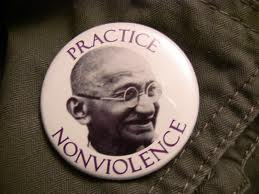

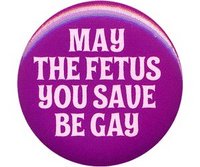

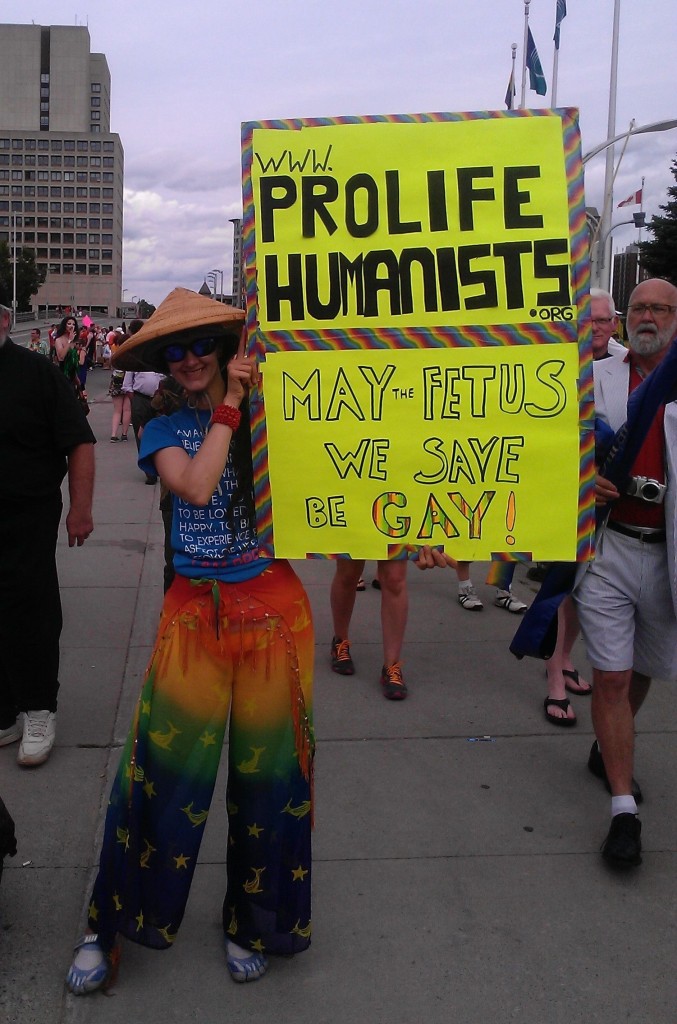
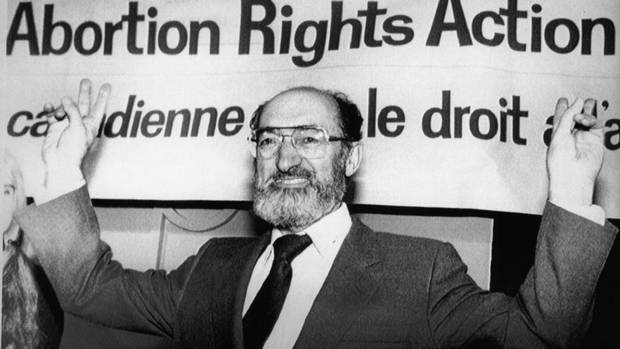

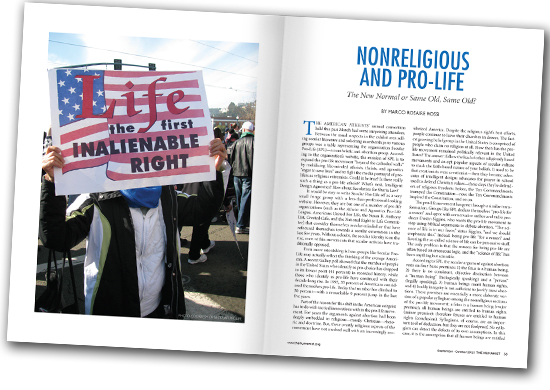
Recent Comments